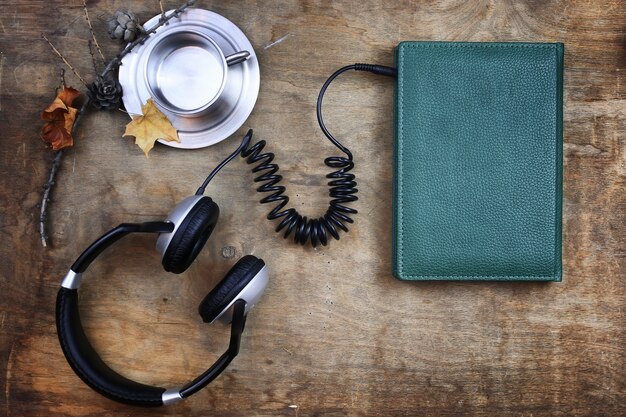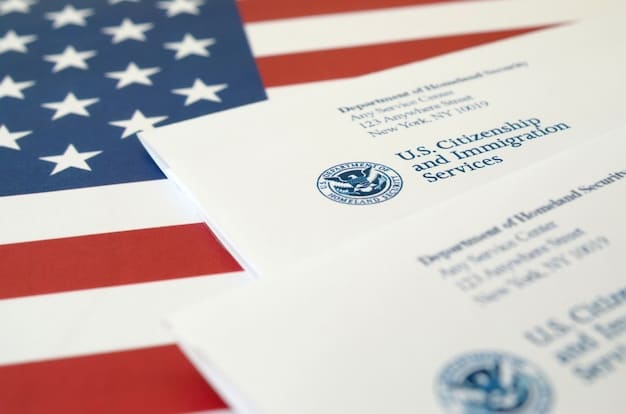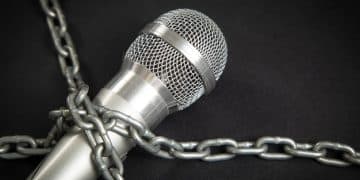Podcast Copyright Law: US Update & Legal Protection for Podcasters

Podcast copyright law updates in the US are essential for creators to understand to avoid legal issues, ensuring their content is protected and compliant with current regulations.
Navigating the legal landscape of podcasting can seem daunting, especially when it comes to copyright. Understanding **podcast copyright law updates: what you need to know to avoid legal issues in the US podcast landscape** is crucial for protecting your creative work and avoiding costly legal battles. This article breaks down the latest updates and offers practical advice for podcasters.
Understanding Basic Copyright Principles for Podcasters
Copyright law provides legal protection for original works of authorship, including literary, dramatic, musical, and certain other intellectual works. For podcasters in the US, grasping these principles is the first step in ensuring compliance and safeguarding their content. Let’s delve into the core aspects.
What Does Copyright Protect?
Copyright protection extends to various elements of a podcast, including the audio recordings, scripts, music, sound effects, and even the unique format or presentation of the show. It’s vital to understand that copyright protects the expression of an idea, not the idea itself. Here’s what you need to know:
- Originality: The work must be original and not copied from someone else.
- Fixation: The work must be recorded or fixed in a tangible medium (e.g., a digital audio file).
- Authorship: The creator of the work is generally the initial copyright holder.
Knowing what is protected helps in avoiding infringement and understanding what rights you have over your own content.
Copyright Ownership and Licensing
Typically, the creator of a podcast episode owns the copyright to that episode. However, if you hire someone to create elements for your podcast (like a theme song or intro), you need to ensure you have a clear agreement regarding copyright ownership. Licensing is another critical aspect.
- Copyright Ownership: This rests with the creator unless otherwise agreed in writing.
- Licensing: This grants permission to use copyrighted material under specific terms.
- Creative Commons: These licenses offer more flexible usage rights than traditional copyright.
Acquiring the appropriate licenses ensures you’re legally allowed to use music, clips, or other copyrighted content in your podcast.
Understanding these basic principles is the foundation for navigating the complexities of podcast copyright law. Armed with this knowledge, podcasters can make informed decisions and protect their creative endeavors.
Fair Use and Its Application to Podcasts
Fair use is a legal doctrine that permits the use of copyrighted material without obtaining permission from the copyright holder under certain circumstances. This is a vital concept for podcasters to understand, as it can provide a defense against copyright infringement claims. Let’s explore how fair use applies in the context of podcasting.
The Four Factors of Fair Use
US courts consider four factors when determining whether a particular use qualifies as fair use:
- The purpose and character of the use: Is it for commercial or non-profit educational purposes? Is it transformative, adding new expression or meaning to the original work?
- The nature of the copyrighted work: Is the original work factual or creative? Is it published or unpublished?
- The amount and substantiality of the portion used: How much of the original work was used, and was it the “heart” of the work?
- The effect of the use upon the potential market for or value of the copyrighted work: Does the use harm the market for the original work?
Analyzing these factors helps determine whether your use of copyrighted material is likely to be considered fair use.
Examples of Fair Use in Podcasting
While fair use is determined on a case-by-case basis, some common scenarios in podcasting may fall under this doctrine:
- Commentary and Criticism: Using excerpts of copyrighted material for the purpose of critique or commentary.
- News Reporting: Reporting on current events and using copyrighted content to illustrate the news.
- Educational Purposes: Using copyrighted materials in an educational podcast.
However, it’s crucial to remember that simply labeling your use as “fair use” does not automatically make it so. Courts will weigh all four factors to make a determination.
Fair use provides podcasters with some flexibility in using copyrighted material, but it requires careful consideration and a thorough understanding of the four factors. Consulting with a legal professional is advisable when in doubt.
Music Copyright and Licensing Options
Music is an integral part of many podcasts, whether used as theme songs, background music, or transitions. However, using copyrighted music without proper authorization can lead to serious legal consequences. Let’s explore the various licensing options available to podcasters to ensure they use music legally.
Understanding Music Copyright
Music copyright typically involves two separate copyrights: one for the musical composition (the melody and lyrics) and one for the sound recording (the specific performance of the song). To legally use a song, you may need to obtain licenses for both.
Types of Music Licenses
There are several types of licenses that podcasters can obtain to use music legally:
- Synchronization License: This license grants permission to use a musical composition in audiovisual works (though podcasts are audio-only, this license is often used).
- Master Use License: This license grants permission to use a specific sound recording of a song.
- Public Performance License: This license grants permission to publicly perform a musical composition.
Understanding which licenses you need depends on how you intend to use the music in your podcast.
Royalty-Free and Creative Commons Music
Podcasters can also explore royalty-free music or music licensed under Creative Commons licenses. Royalty-free music requires a one-time payment for a license, allowing you to use the music without paying recurring royalties. Creative Commons licenses offer varying levels of permission, often allowing free use with attribution.
Navigating music copyright can be complex, but understanding your licensing options is essential for avoiding legal issues. Always ensure you have the necessary permissions before using music in your podcast.
Protecting Your Podcast with Copyright Registration
While copyright protection is automatic upon creation of an original work, registering your podcast with the US Copyright Office offers significant advantages. Registration provides a public record of your copyright claim and enables you to pursue legal remedies more effectively in case of infringement. Let’s examine the benefits and the process of registering your podcast.
Benefits of Copyright Registration
Copyright registration provides several key benefits:
- Public Record: Registration creates a public record of your copyright claim.
- Legal Recourse: Registered works can seek statutory damages and attorney’s fees in infringement lawsuits.
- Evidence of Ownership: Registration serves as evidence of ownership if you need to prove it in court.
These benefits make registration a worthwhile investment for protecting your podcast.

How to Register Your Podcast
The process of registering your podcast with the US Copyright Office is relatively straightforward:
- Prepare Your Application: Gather all necessary information about your podcast, including the title, author, and publication date.
- Submit Your Application: File an application online through the Copyright Office’s website (www.copyright.gov).
- Pay the Fee: Pay the required registration fee.
- Deposit a Copy: Submit a copy of your podcast episode (or a collection of episodes) to the Copyright Office.
Following these steps will ensure your podcast is properly registered.
Registering your podcast is a proactive step toward protecting your intellectual property. It provides valuable legal recourse and serves as a deterrent to potential infringers.
Podcast Guest Agreements and Copyright
Many podcasts feature guests who contribute their expertise, stories, and opinions. It’s crucial to have clear agreements with guests regarding copyright ownership and usage rights to avoid potential disputes. Let’s explore the importance of podcast guest agreements and what they should include.
Why Guest Agreements are Important
Guest agreements clarify who owns the copyright to the guest’s contributions and how the podcast host can use those contributions. Without a written agreement, ambiguities can arise regarding ownership, potentially leading to legal issues.
Key Elements of a Guest Agreement
A comprehensive guest agreement should address the following points:
- Copyright Ownership: Specify who owns the copyright to the guest’s contributions (e.g., the guest retains ownership, or it’s transferred to the podcast host).
- Usage Rights: Outline how the podcast host can use the guest’s contributions (e.g., in the podcast episode, in promotional materials, on social media).
- Permissions: Obtain permission to edit, modify, or excerpt the guest’s contributions.
Addressing these elements ensures both parties are clear about their rights and obligations.
Podcast guest agreements are essential for protecting the interests of both the podcast host and the guest. Clear, written agreements can prevent misunderstandings and legal disputes down the road.
Navigating Copyright Infringement Claims
Despite your best efforts to comply with copyright law, you may still face a copyright infringement claim. Knowing how to respond to such claims is critical for protecting your podcast and mitigating potential damages. Let’s outline the steps you should take if you receive a copyright infringement notice.
Responding to a Copyright Infringement Notice
If you receive a notice alleging copyright infringement, take the following steps:
- Review the Notice: Carefully examine the notice to understand the nature of the claim and the specific content alleged to be infringing.
- Assess the Claim: Evaluate whether the claim has merit. Did you use copyrighted material without permission? Does fair use apply?
- Take Action: Depending on your assessment, you may choose to remove the infringing content, obtain a license, or challenge the claim.
Defenses Against Copyright Infringement
Several defenses may be available to you, including:
- Fair Use: Assert that your use of the copyrighted material qualifies as fair use.
- Lack of Infringement: Argue that you did not actually copy the copyrighted material.
- License: Prove that you had a valid license to use the copyrighted material.
Seeking legal advice is crucial when dealing with copyright infringement claims.
Navigating copyright infringement claims can be challenging, but a prompt and informed response is crucial for protecting your podcast and minimizing potential legal liabilities.
| Key Point | Brief Description |
|---|---|
| 📜 Basic Principles | Understand copyright’s protection of original works, authorship, and fixation. |
| ⚖️ Fair Use | Apply the four factors of fair use (purpose, nature, amount, market effect) to your podcast content. |
| 🎵 Music Licensing | Secure necessary licenses (synchronization, master use) for music, or use royalty-free options. |
| 🤝 Guest Agreements | Clarify copyright ownership and usage rights with podcast guests in written agreements. |
FAQ
▼
Copyright is a legal right granted to creators for their original works, including audio recordings. For podcasts, it protects the audio, scripts, music, and other creative elements from unauthorized use.
▼
The types of licenses that podcasters can obtain to use music legally are the Synchronization License (use a musical composition in audiovisual works) , Master Use License (use a specific sound recording of a song) and Public Performance License (publicly perform a musical composition).
▼
Copyright registration creates a public record of your claim, allows you to seek statutory damages in infringement lawsuits, and serves as evidence of ownership in legal proceedings.
▼
Fair use allows limited use of copyrighted material without permission for purposes like commentary, criticism, or news reporting, but it’s determined on a case-by-case basis by courts considering four factors.
▼
Royalty-free music requires a one-time payment for a license, while Creative Commons licenses offer various levels of permission, often allowing free use with attribution, providing cost-effective options for podcasters.
Conclusion
Staying informed about podcast copyright law is essential for protecting your creative work and avoiding legal pitfalls. By understanding basic principles, fair use, music licensing, guest agreements, and the process of copyright registration, you can navigate the legal landscape with confidence and focus on creating engaging, original content.





